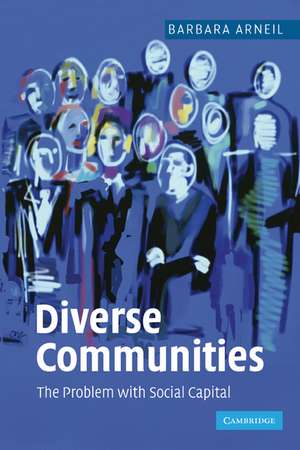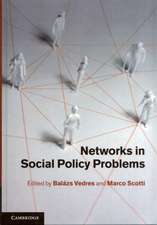Diverse Communities: The Problem with Social Capital
Autor Barbara Arneilen Limba Engleză Paperback – 13 sep 2006
| Toate formatele și edițiile | Preț | Express |
|---|---|---|
| Paperback (1) | 287.66 lei 6-8 săpt. | |
| Cambridge University Press – 13 sep 2006 | 287.66 lei 6-8 săpt. | |
| Hardback (1) | 720.84 lei 6-8 săpt. | |
| Cambridge University Press – 13 sep 2006 | 720.84 lei 6-8 săpt. |
Preț: 287.66 lei
Nou
Puncte Express: 431
Preț estimativ în valută:
55.05€ • 59.78$ • 46.24£
55.05€ • 59.78$ • 46.24£
Carte tipărită la comandă
Livrare economică 22 aprilie-06 mai
Preluare comenzi: 021 569.72.76
Specificații
ISBN-13: 9780521673907
ISBN-10: 0521673909
Pagini: 280
Dimensiuni: 153 x 227 x 16 mm
Greutate: 0.45 kg
Editura: Cambridge University Press
Colecția Cambridge University Press
Locul publicării:Cambridge, United Kingdom
ISBN-10: 0521673909
Pagini: 280
Dimensiuni: 153 x 227 x 16 mm
Greutate: 0.45 kg
Editura: Cambridge University Press
Colecția Cambridge University Press
Locul publicării:Cambridge, United Kingdom
Cuprins
1. Social capital, justice and diversity: an introduction; 2. The progressive era: past paradise?; 3. The present malaise in civic participation: empirical and normative dimensions; 4. The causes of 'decline' in social capital theory; 5. Civic trust and shared norms; 6. Beyond Bowling Alone: social capital in twenty-first century America; 7. Justice in diverse communities: lessons for the future.
Recenzii
'Arneil should be required reading alongside Bowling Alone. Her arguments about the power dynamics undergirding social capital and the importance of conflict offer a critical corrective to a rose-coloured view of social cohesion and trust.' Canadian Journal of Sociology
'What sets Arneil's book apart from other multicultural and feminist critiques of Bowling Alone is the way in which she uses her re-interpreted history of American civil society to point toward alternative regulatory principles of civic engagement for an increasingly multicultural America … an important contribution toward conceiving a form of communal belonging that will also respond to people's desires for cultural distinctness, mutual respect, and meaningful membership.' Scott Mclean, Political Science Quarterly
'For Arneil, social capital is not neutral, nor does it have only positive outcomes. Like other social capital theorists, such as Pierre Bourdieu, she sees it as another means for the powerful to protect their interests. … Arneil's much more complex and exacting challenge to us in Diverse Communities is to build a just society in which everyone truly belongs and everyone can fully participate and flourish.' Tim Broadhead, Literary Review of Canada
'For Arneil, the assertion and recognition of issues about diversity and social justice on a broad front in contemporary America fail to accord with Putnam's vision of what we may generally regard as the 'good' society. Arneil's central criticism is reinforced by a range of sophisticated arguments drawing on the women's movement, philanthropy, and civil action, as well as political theory, and the broader and critical perspectives of Pierre Bourdieu and Jean Cohen … Arneil's achievement in Diverse Communities may well prove to be like that of Friedrich Engels with his Anti-During in the nineteenth century: readers have remembered the critique while the work subjected to such treatment has itself passed into oblivion.' Harry Goulbourne Journal of Ethnic and Racial Studies
'What sets Arneil's book apart from other multicultural and feminist critiques of Bowling Alone is the way in which she uses her re-interpreted history of American civil society to point toward alternative regulatory principles of civic engagement for an increasingly multicultural America … an important contribution toward conceiving a form of communal belonging that will also respond to people's desires for cultural distinctness, mutual respect, and meaningful membership.' Scott Mclean, Political Science Quarterly
'For Arneil, social capital is not neutral, nor does it have only positive outcomes. Like other social capital theorists, such as Pierre Bourdieu, she sees it as another means for the powerful to protect their interests. … Arneil's much more complex and exacting challenge to us in Diverse Communities is to build a just society in which everyone truly belongs and everyone can fully participate and flourish.' Tim Broadhead, Literary Review of Canada
'For Arneil, the assertion and recognition of issues about diversity and social justice on a broad front in contemporary America fail to accord with Putnam's vision of what we may generally regard as the 'good' society. Arneil's central criticism is reinforced by a range of sophisticated arguments drawing on the women's movement, philanthropy, and civil action, as well as political theory, and the broader and critical perspectives of Pierre Bourdieu and Jean Cohen … Arneil's achievement in Diverse Communities may well prove to be like that of Friedrich Engels with his Anti-During in the nineteenth century: readers have remembered the critique while the work subjected to such treatment has itself passed into oblivion.' Harry Goulbourne Journal of Ethnic and Racial Studies
Notă biografică
Descriere
Robert Putnam's social capital thesis re-examined from the perspective of women and cultural minorities.




















